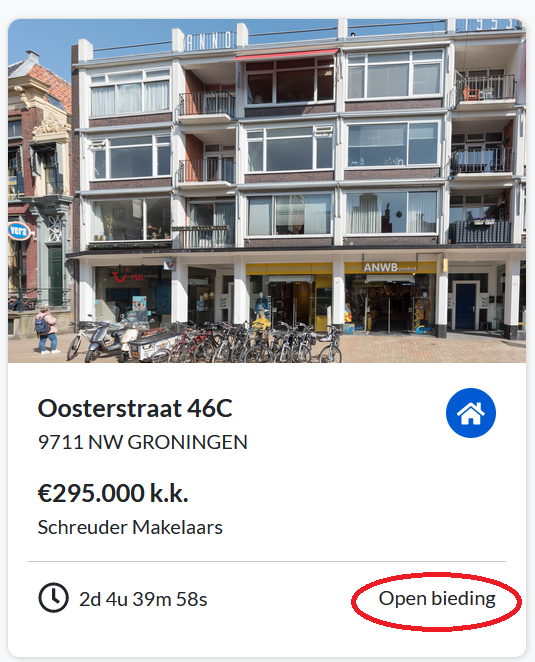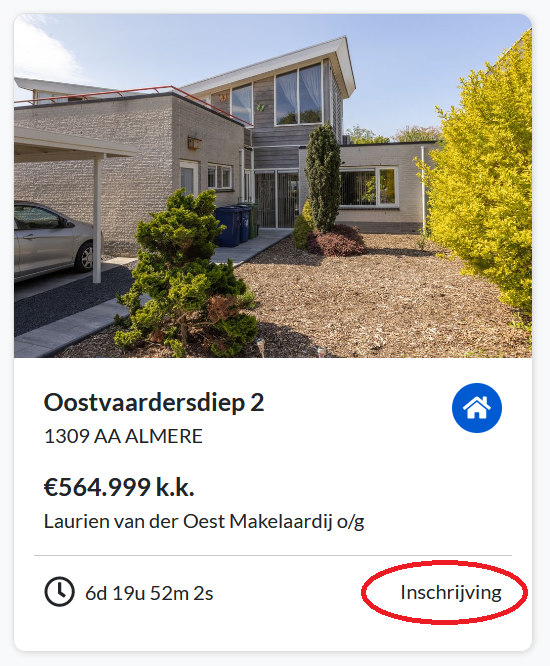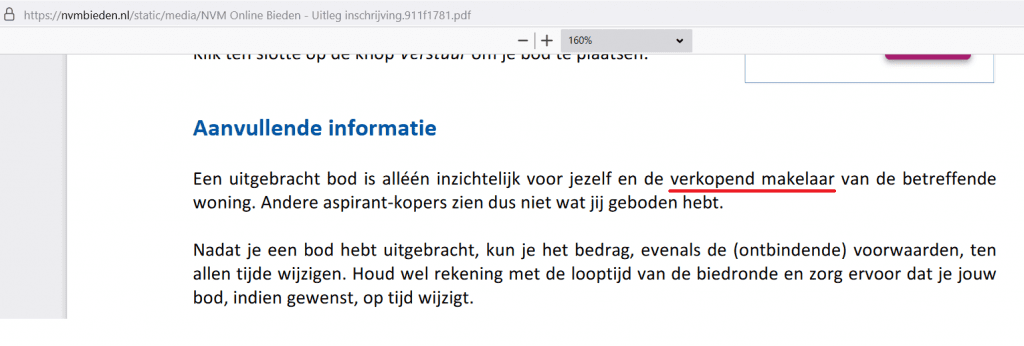A hot topic at the Home Owners Association is always unfair bidding practices at real estate agents. Online bidding should solve all these problems. But is that really so? What exactly should this Online Bidding protect against? What are the advantages and what are the disadvantages? And is there perhaps another alternative?
How does online bidding work?
Briefly explained, there are 2 ways of bidding online. The first is really just an online auction. Anyone can make a bid and everyone can also see what the highest bid is. The auction closes at a fixed time, but if a bid comes in at the last minute (and that’s exactly what happens) the auction is extended by a few minutes each time. This will be extended until there are no more outbids.
The other way of bidding online is an online registration. The bidders cannot see from each other what has been bid and the bid always closes at 1 fixed moment.
With both bidding systems, later (after the cooling-off period has expired) everyone will be able to see what the bids have been. The highest bid does not necessarily have to be the winner, because the selling party also looks very closely at the conditions and perhaps also at the profile/personal message of the bidder.
The pressure on the broker
Where exactly is it going wrong? In other words: what exactly should online bidding prevent and what exactly is it the solution for? In short, there are a number of things that are not going well right now. In an extremely overstretched market, a lot of despair, frustration and emotion arise. Housing is a basic necessity of life for everyone and house seekers compete against each other. This can prevent the house seeker from putting a lot of pressure on the purchasing broker to do even more to score this time. And this, in turn, encourages extremely high bids and potentially unfair bidding practices.
If we look at the side of the selling broker, there is also a lot of pressure. There is very little housing stock and there are many real estate agents. Many houe sellers invite several brokers to submit a sales proposal. A consequence of this is, among other things, that brokers set the expected sales value of a home as high as possible in their sales proposal. The sellers really want to get the most out of it. Sellers are extremely sensitive to the amount of expected sales proceeds that a broker states in his valuation. Because the choice of a sales agent often strongly depends on the level of the expected sales value, sales agents often set this (too) high and set the bar for themselves very high.
The broker’s box of tricks
The sales broker has a box of tricks within the rules but also sometimes outside the rules. For example, it is completely legitimate ‘within the rules’ to really properly style the home, to present it, to play with marketing instruments and to create a feeling of ‘fear of missing out’. The latter is done by ensuring that you always meet the new viewers at the front door when you leave.
Going outside the rules
The current system is suitable for buying brokers to put pressure on the selling broker to provide information about the latest situation of the bids. In other words: fishing for the highest bid that is available at that moment. It is also possible to fish for information about the conditions of bids that are available (with/without reservation of financing). How often does this happen? We don’t know and is unknown. It is true that the current traditional way of bidding cannot adequately defend itself against unfair bidding practices such as information leakage.
We do business all over the Netherlands ourselves and we believe that in the areas where the housing market is most overheated (Haarlem, Amsterdam, Utrecht, etc.) such practices occur most often. Furthermore, it is nonsense that at the moment affiliation with a trade association such as NVM or VBO reduces or excludes the chance of unfair bidding practices. The trade associations claim they do, but there is simply no control from them on bids that have been made.
For the brokers (including us) it is very frustrating that an unfair way can work. When we bid on a house, we also want more certainty that our bid will not be fooled and that we will be the victims of our bid being leaked to another broker. The problem, however, is again that there is simply no oversight of the bids and/or negotiations of all houses currently being sold.
Buyers disappointed and suspicious
But whether or not the bids were fair, with the vast majority of houses sold, several people are disappointed because they didn’t get it. That disappointment is reinforced by a bit of despair (this is the umpteenth time that one misses out) and emotion. There is already a lot to see, hear and read about unfair bidding practices at brokers, so one starts to wonder whether this bidding was fair.
Sellers disappointed and suspicious
Sellers are not so happy with another part of the houses. Sellers would then have expected a much higher sales proceeds. After all, the broker had written an expected sales proceeds in his sales proposal, which turned out not to have been achieved. It is regularly the case that sellers also do not feel good about a sale and sometimes suspect that their sales agent has not acted in their interests, but has worked with a hidden agenda. ‘Perhaps he struck a deal with a buying broker and made money from it.’ We have also been accused of the latter.
The problems in a nutshell:
- Current traditional bidding is not sufficiently resistant to unfair bidding practices
- At the moment there is no control and supervision from the trade associations on bids that have been made
- There is mistrust among bidders
- There is mistrust among sellers
Is online bidding the solution to unfair bidding practices?
Let’s see if online bidding is the answer. First we look at an online open bid and then at an online registration.
Online open bid
This is what it looks like:

Simple explanation:
- Anyone can create an account and make a bid and add their bidding conditions (financial reservation, delivery term, etc.) to this.
- Everyone can see all bids, including the highest bid.
- The bid closes at a fixed time, unless a higher bid is made at the last minute and/or people continue to bid against each other.
- The sellers choose the offer that is most interesting to them.
Is this the solution?
Simple answer: no.
The reason for this is that the conditions under which the bids are made are not public. The sellers may choose the bid that finished in 3rd place (ie lower than the highest bid). The reason may be that it has no financial reservation.
The result is that you still get indignation and mistrust because the people who bid higher than the winning bid do not understand why they didn’t get it.
The problem is that with this system only a purchase price is public, but not the conditions (reserved, delivery period, etc.).
Online registration
Another form of Online bidding is Online registration. This is what it looks like when registering online:

Simple explanation:
- Anyone can create an account and make a bid and add their bidding conditions (financial reservation, delivery term, etc.) to this.
- The bids are NOT public
- The bid closes at a fixed time no matter what.
- The sellers choose the offer that is most interesting to them.
Is this the solution?
Also here you still have the problem that the conditions under which the bids are made are not public. So you have the same problem as with the online auction.
The question is whether sufficient measures have been taken so that no information about the bids can be leaked.
With NVM Online Bidding , the bids are public for the broker during the bidding, see here:

(source: nvmbieden.nl on 27-05-2022)
The selling broker can therefore see what is offered! This allows information to be leaked by the selling broker, while Online Bidding wants to give people the impression that it is fully secured. In our view a very bad thing.
Fair Bidding is a bidding platform where that seems to go well. During registration, the broker can only see how many bids have been made, but not what has been bid. source .
Mandatory online bidding?
Then another problem arises and that is: can you oblige houseowners to sell the house via an Online Bidding System? In Norway, for example, this is the case, but what people forget there is that the broker has a completely different role. This is because it acts for the seller as well as for the buyer.
Also, a house is not always sold through a registration. It may also be that someone is extremely eager to buy a home and is willing to pay a disproportionately high amount for it, on the condition that he is then awarded it immediately. This may not be fun for other candidates, but in our view the houseowner should always have the right to choose how and to whom his property is sold.
What are the best solutions against unfair bidding practices?
First of all: you have to set in Online Bidding that either everyone sees the amounts, or no one. The registration of NVM Online Bieden is not fair at the moment. Next, I think it is important not to force selling parties to sell via Online Bidding. What needs to happen is that with traditional bidding, the sector organizations now really take their responsibility and start to institute active supervision. The brokerage profession consists on many fronts of constant filing of the bids and that filing must always be there. The broker must be able to hand over his or her bidding file at all times at every first request from a trade association (randomly or after complaints). We have worked out in detail what that would look like: see below.
Establish supervision to combat unfair bidding practices (proposal)
- Every real estate sector organization will have it’s own ‘Bidding Supervision Committee’.
- Trade associations expressly prohibit their affiliated members (= brokers) from bidding in the role of purchase broker if a closing period has passed. If a broker is in the role of sales broker and a bid is received after the closing date, this must always be reported immediately to the ‘Bidding Supervision Committee’.
- Every affiliated broker just continues to do the bidding and negotiations as they already do. This is therefore allowed via e-mail, your own bidding system, an Amsterdam bidding system, via Fair Bidding or, for example, via the NVM Online.
- Every broker is obliged to keep a ‘bid file’ for each sales file, in which all e-mails with the bids that have been made are archived. If a sale has been made via an online bidding system, a printout of the ‘log’ with all bids must be added.
- This bid file also stores the communication to the bidders about the closing time of the bids That’s what it looks like.
- If people have complaints about bidders or sellers after the sale, they can submit them to the Bidding Supervision Committee. This committee will contact the broker and request to immediately hand over the bid file with all bids in 1 timeline.
- When checking the ‘Bidding Supervision Committee’, among other things, the communicated closing date+time versus the e-mails with bids is examined. The timeline of the sales record is checked Where at thismoment goes wrong is that information about the highest bid can be leaked after the closing time of the bids and bids can still be e-mailed after the closing time on the basis of this. It is also possible that the selling broker acts fairly, but a purchasing broker simply makes an aggressive offer after the closing period outside the rules of the game. After all, the buying broker knows that the selling broker is legally obliged to submit every offer to the sellers.
- As a selling broker you simply have to be able to demonstrate that the winning bid was sent before the closing date that has been communicated. Example: a closing date of 1 June 12:00 has been communicated. There are 10 bids. A later check by the ‘Bidding Supervision Committee’ shows that the buyer’s bid was not received until 12:15 pm. This bid appears to be higher than the highest bid that was made at 12:00. The selling broker must be able to demonstrate that he has reported this bid at 12:15 pm to the Bidding Supervision Committee. The purchasing broker who has made this bid after closing time will be called to account after this notification by the ‘Bidding Supervision Committee’.
- In the event of insufficient justification, the relevant broker can be nominated by the ‘Bidding Supervision Committee’ by the disciplinary committee of the relevant sector association. There the disciplinary committee can rule on the case and impose a reprimand, a fine or even a suspension on the broker. Any decision of the disciplinary committee will be published publicly.
- Every broker receives an unannounced inspection 1-2 times a year by the ‘Bidding Supervision Committee’. Brokers with more complaints can expect such a check more often.
For brokers, file formation is always important. Creating a bidding file takes almost no extra effort. If all certified brokerage firms from the trade association are obliged to report bids after closing hours and to work with a bidding file, then that is an extra motivation for all purchase brokers and all sales brokers not to put a stop to unfair bidding practices.
Conclusion
Online bidding is a great addition to the current bidding system, but it does not solve the problem. Furthermore, online registrations (from NVM Online bidding) give the impression that this is 100% fair, while it is also just a leak system (the selling broker can still leak the highest bid). Also, in a free market economy, you shouldn’t want owners not to know how to sell their property. In our view, the best solution is always to let the market have free choice and to look for a solution in supervision, control and enforcement. This is possible thanks to the sector associations, a Bidding Supervision Committee and the disciplinary courts.
React?
Do you have (other) ideas, feedback or additions based on this article? Let everyone know here by commenting below.

